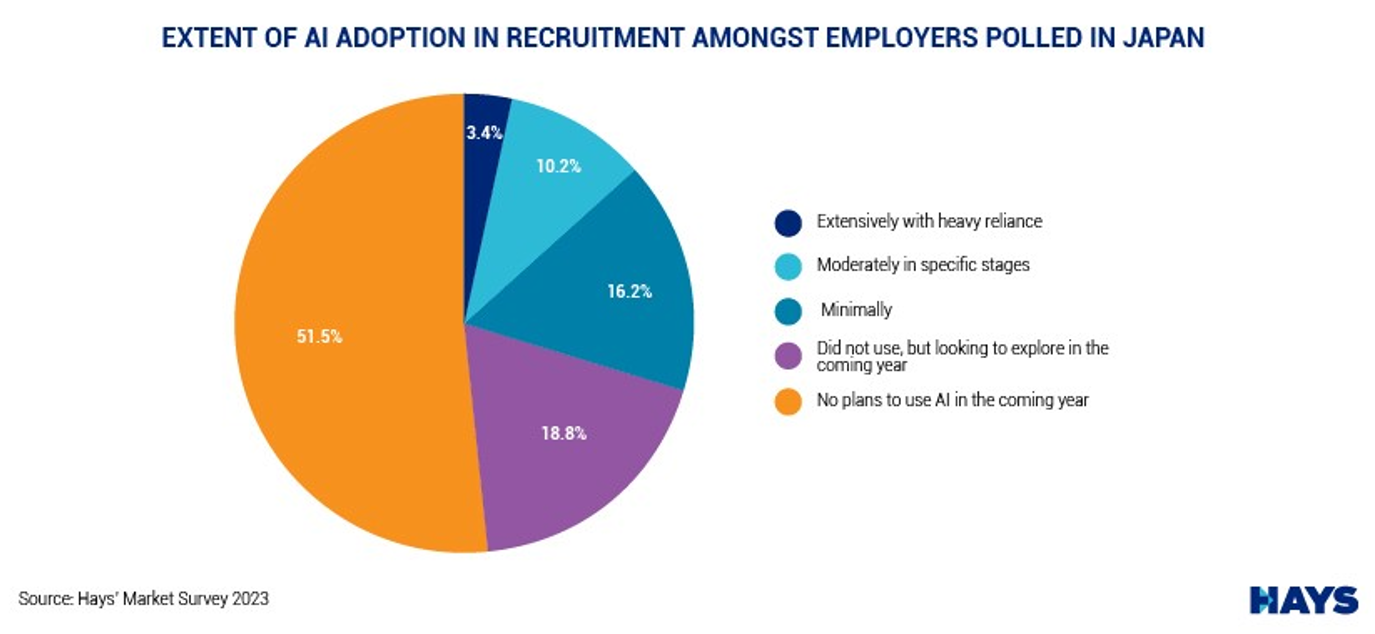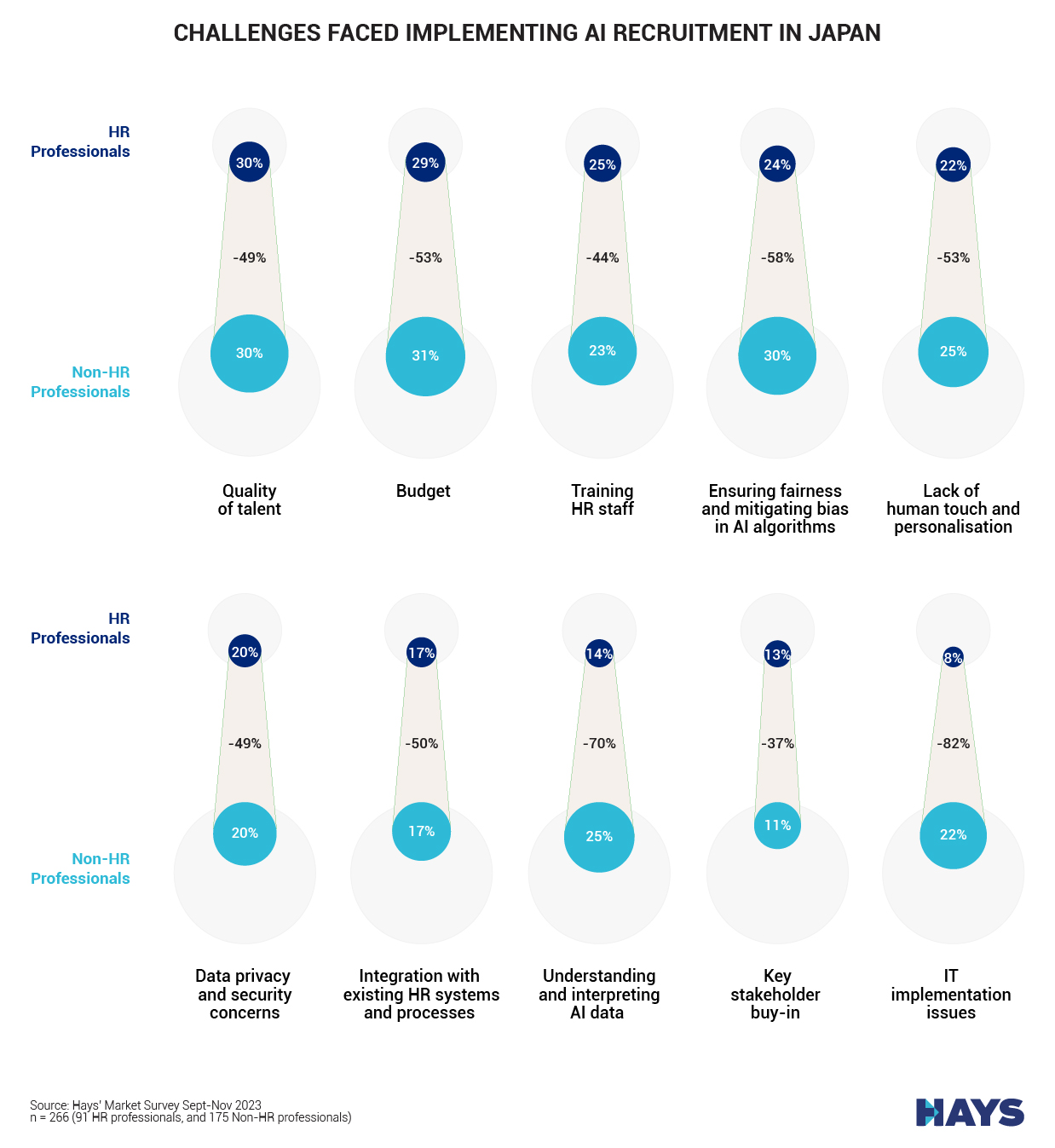Emerging Human Resources Trends for Japan in 2024
AI Recruitment and Tight Budgets

In a year headlined by local and international challenges affecting the economic outlook, businesses are exercising caution pertaining to growth and expansion. Spurred by a need to ensure operational continuity in a sustainable manner, leaders are revisiting recruitment and talent strategies in search of alternative solutions that enable their Human Resources teams to not just survive but thrive.
We have discussed at length the challenges accountancy, finance and technology teams face when it comes to balancing budgets while securing essential talent to satisfy changing business requirements. But with a shifting eye on current trends, we found it pertinent to explore how teams closest to sourcing, hiring, and managing employees currently fare in 2024.
For a better understanding of talent trends affecting Human Resources here in Japan, we spoke to Yuna Kim, Team Manager at Hays Japan with further insights on this evolving specialism from our Hays Asia Salary Guide.
CONTENTS
- LEANER HUMAN RESOURCES TEAMS, RISING INDUSTRIES
- HUMAN RESOURCES CONFIDENCE IN RECRUITING TALENT BELOW AVERAGE
- AI IN RECRUITMENT IS STILL BUDDING
- GAPS TO IMPLEMENTING AI IN HR
- THE MOST IN-DEMAND ROLES IN HUMAN RESOURCES FOR JAPAN IN 2024
LEANER HUMAN RESOURCES TEAMS, RISING INDUSTRIES
“Despite global economic uncertainty in 2023, the job market in Japan remains relatively stable, with demand for labour gradually increasing,” said Yuna. “As the value of the yen has been falling, there is a higher demand for HR talent especially in the retail and service industries, including tour companies and hotels with foreign tourism on the rise”. Both domestic and global companies are also in need of strong bilingual or trilingual HR candidates. However, talent search will be impacted as Japan faces a labour shortage due to its aging population.
HUMAN RESOURCES CONFIDENCE IN RECRUITING TALENT BELOW AVERAGE
And while candidate availability currently surpasses job supply in Japan, it will prove difficult to encourage cautious HR professionals who are likely to remain passive in favour of job security. Leaders have begun to recognise this, especially those seeking specialist candidates for high skilled positions.
Such companies have begun to relax their requirements for candidates, providing more flexible job scopes, career paths, and better benefit packages. Certain multinational companies are already looking to get ahead of their competitors by implementing four-day workweeks; an enticing proposition for candidates who value work-life balance.
AI IN RECRUITMENT IS STILL BUDDING

Usage to date has mostly been for a mix of automation and optimisation of various tasks. 34% of respondents use it to perform predictive analysis for candidate fit, 34% use it to assist with interview scheduling and coordination, while 28% use it for resume screening and shortlisting.
Additionally, while 69% of human resources personnel support the use of AI tools to help them perform their tasks at work, only 30% of them believe their organisations have embraced AI sufficiently to stay relevant in the future.
THERE ARE STILL GAPS TO IMPLEMENTING AI IN HR WIDELY
This stems from a lack of confidence in upskilling. 73% of HR professionals did not feel their employer would support them in developing the necessary AI skills for their role. HR leaders will need to explore pathways to upskilling to ensure that these expectations are met, especially if their organisations plan on introducing AI tools to their workforce.
When polled about the primary challenges faced when implementing AI, the top three factors that surfaced were as follows:
- 30% of human resources respondents were concerned about the quality of talent failing to meet requirements
- 29% mentioned concerns about budget constraints
- 25% cited concerns regarding training HR staff to effectively use AI tools

The survey showed that more non-HR professionals were concerned about IT implementation issues, understanding and interpreting AI-generated candidate data, and data privacy and security concerns.
These underscore a desire for adequate IT support and infrastructure, and finetuning of AI systems with ongoing monitoring for bias to ensure fairness in the recruitment process. Providing managers with training and access to AI recruitment tools would also allow them to experience selections first-hand, giving them leeway to interpret and understand selections for more informed decision-making.
As AI education grows more widespread among the populace, concerns regarding the ethical usage of AI tools in recruitment, especially for determining candidate employability, have naturally risen. 34% of HR professionals in Japan believe organisations should disallow the use of AI tools until there are sufficient regulations and ethical safeguards in place, while 16% remain unsure.
Businesses have a lot of ground to cover when it comes to AI policies. Only 22% of HR professionals acknowledged that their organisation or leader had issued an AI tool usage policy, or provided guidelines on AI usage and restrictions for work. Addressing these concerns will be crucial to foster trust in hiring processes.
THE MOST IN-DEMAND ROLES IN HUMAN RESOURCES FOR JAPAN IN 2024
- Human Resources Business Partner
- Human Resources Director
- Human Resources Manager
- Human Resources Generalist
- Talent Acquisition
- Human Resources Operations
Get comprehensive data for multiple industries’ salary benchmarks in Asia and industry recruitment overviews to guide your talent management or career decisions.
 For Professionals, find out… |
 For Employers, find out... |
|---|---|
|
|
|
|
|
|


Has your earning potential changed? Whether you’re looking for a new job or a pay rise, do a salary check and discover what professionals at your level typically earn in Japan with our dedicated salary calculator.
Reports
Whitepapers
The Future of Work: How AI is impacting your workforce
2024/2025 Hays Asia DE&I report
The Workforce of the Future Report
2024 Japan’s Technology Talent Trends
2024 Japan Accountancy and Finance Talent Trends
Future of Asia’s Technology Industry
Diversity, Equity & Inclusion Report
DNA series


